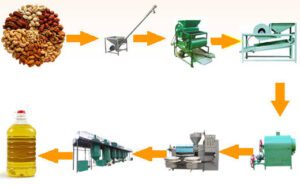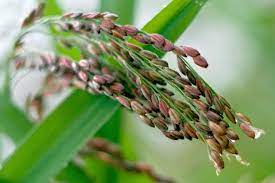Guide on Groundnut Oil Processing, Health Benefits and Uses
Groundnut oil processing refers to the series of steps involved in extracting oil from groundnuts (also known as peanuts). This involves several stages, including cleaning, shelling, roasting, pressing, and filtering.
Groundnut oil, also known as peanut oil, is a vegetable oil that is derived from the groundnuts (peanuts). It is a popular cooking oil in many parts of the world due to its mild flavor, high smoke point, and health benefits.
Groundnut oil is rich in monounsaturated and polyunsaturated fats, which are considered heart-healthy fats. It is also a good source of vitamin E, an antioxidant that helps protect cells from damage.
In cooking, groundnut oil is often used for frying due to its high smoke point, which means it can be heated to high temperatures without smoking or burning. It is also used in salad dressings, marinades, and as a base for sauces.
When buying groundnut oil, it is important to choose a high-quality, unrefined oil that has been cold-pressed or expeller-pressed, as this will retain the oil’s natural nutrients and flavor.
It is also important to store the oil in a cool, dark place away from heat and light to prevent it from going rancid.
Read Also: 10 Healing Powers of Turmeric (Curcuma longa)
Groundnut Oil Processing Guide

The first stage of processing involves cleaning the groundnuts to remove any foreign materials, such as stones, sand, and leaves. This is typically done using a vibrating sieve or a pneumatic cleaner.
Below is a step-by-step guide to groundnut oil processing:
Cleaning: The groundnuts are first cleaned to remove any foreign materials, such as stones, sand, and leaves. This is typically done using a vibrating sieve or a pneumatic cleaner. The cleaned groundnuts are then passed through a metal detector to ensure that no metal fragments are present.
Shelling: The outer shell or hull of the groundnuts is then removed. This can be done manually or using a mechanical sheller. Manual shelling involves cracking the shells with a wooden or metal pestle, while mechanical shelling involves using a machine that uses pressure and friction to remove the shells.
Roasting: The shelled groundnuts are then roasted to enhance their flavor and aroma. Roasting also helps to reduce the moisture content of the groundnuts, which improves the efficiency of oil extraction.
The groundnuts can be roasted using a variety of methods, including open flame, hot air, or microwave roasting.
Pressing: The roasted groundnuts are then pressed to extract the oil. This can be done using a mechanical press or an expeller.
A mechanical press uses a hydraulic cylinder to exert pressure on the groundnuts, while an expeller uses a screw to compress the groundnuts and extract the oil. The resulting oil and cake are separated using a filter.
Refining: The final step is to refine the oil to remove any impurities and to improve its shelf life. Degumming involves removing any gums and phospholipids from the oil, while neutralization involves removing any free fatty acids.
Bleaching involves removing any pigments or impurities, and deodorization involves removing any odors or flavors. The refined oil is then packaged and stored for distribution.
Overall, groundnut oil processing involves a series of steps to extract, refine, and purify the oil from groundnuts, resulting in a high-quality cooking oil that is rich in nutrients and flavor.
Health Benefits of Groundnut Oil

Groundnut oil, also known as peanut oil, is a popular cooking oil that is commonly used in many cuisines around the world. Here are some of the health benefits associated with consuming groundnut oil:
Heart health: Groundnut oil is rich in monounsaturated and polyunsaturated fats, which can help to lower bad cholesterol levels and reduce the risk of heart disease. These healthy fats also help to promote healthy blood flow and lower blood pressure.
Brain health: Groundnut oil is a good source of vitamin E, an antioxidant that helps to protect the brain from oxidative stress and inflammation. Vitamin E has also been shown to improve cognitive function and reduce the risk of age-related cognitive decline.
Skin health: Groundnut oil is high in vitamin E and healthy fats, which can help to promote healthy skin and prevent skin damage caused by free radicals. Vitamin E also has anti-inflammatory properties, which can help to reduce redness and inflammation in the skin.
Digestive health: Groundnut oil contains healthy fats and fiber, which can help to promote healthy digestion and prevent constipation. The oil also contains phytosterols, which can help to reduce the absorption of cholesterol in the gut.
Anti-inflammatory properties: Groundnut oil contains resveratrol, a compound that has been shown to have anti-inflammatory properties. This can help to reduce inflammation throughout the body and reduce the risk of chronic diseases such as heart disease, diabetes, and cancer.
Weight management: Groundnut oil is a good source of healthy fats and contains fewer calories than other oils, such as coconut oil. This can make it a good choice for those who are trying to manage their weight or maintain a healthy diet.
Additionally, groundnut oil is a nutritious and healthy cooking oil that offers many health benefits. However, like all oils, it should be consumed in moderation as part of a balanced diet.
Uses of Groundnut Oil

Groundnut oil, also known as peanut oil, is a widely used vegetable oil with many applications in cooking, cosmetics, and industrial processes. Below are some common uses of groundnut oil:
Cooking: Groundnut oil is a popular cooking oil due to its high smoke point, mild flavor, and versatility. It is used for frying, sautéing, grilling, and roasting, and is commonly found in Asian, African, and Middle Eastern cuisines.
Salad dressing: Groundnut oil is often used as a base oil for salad dressings due to its mild flavor and high nutritional value.
Baking: Groundnut oil is used in baking to add moisture and richness to baked goods. It is also used to grease baking pans and prevent sticking.
Cosmetics: Groundnut oil is used in cosmetics and skincare products due to its moisturizing and nourishing properties. It is often found in body lotions, hair care products, and lip balms.
Industrial processes: Groundnut oil is used in various industrial processes, including paint and varnish manufacturing, lubricant production, and soap making.
Health benefits: Groundnut oil is rich in monounsaturated and polyunsaturated fats, which are beneficial for heart health. It also contains vitamin E, an antioxidant that helps protect against cellular damage.
Overall, groundnut oil is a versatile and useful oil with many applications in cooking, cosmetics, and industry.
Read Also: Basil Plant (Ocimum Basilicum): Nutrition, Health Benefits and More
Economic Importance of Groundnut Oil
Groundnut oil, also known as peanut oil, is a widely used cooking oil that has significant economic importance in the food industry. Here are some of the ways in which groundnut oil is economically important:
Industrial applications: Groundnut oil is also used in the manufacture of a variety of products, including cosmetics, soaps, and lubricants. It is also used as a biodiesel feedstock, making it an important component of the renewable energy industry.
Economic impact: The production and processing of groundnut oil generates significant economic benefits for countries that produce and export it. In addition, the cultivation of groundnuts provides income for farmers and employment opportunities for workers involved in harvesting, processing, and marketing the crop.
Export earnings: Groundnut oil is a valuable commodity in international trade, with major producers such as India, China, and the United States exporting significant quantities to other countries. The export of groundnut oil can generate significant foreign exchange earnings for countries that rely on it as a key export commodity.
In summary, groundnut oil has significant economic importance as a widely used cooking oil, a healthy food ingredient, a raw material in the production of industrial products, and a valuable export commodity.
Read Also: Domestic Waste Complete Management Guide









